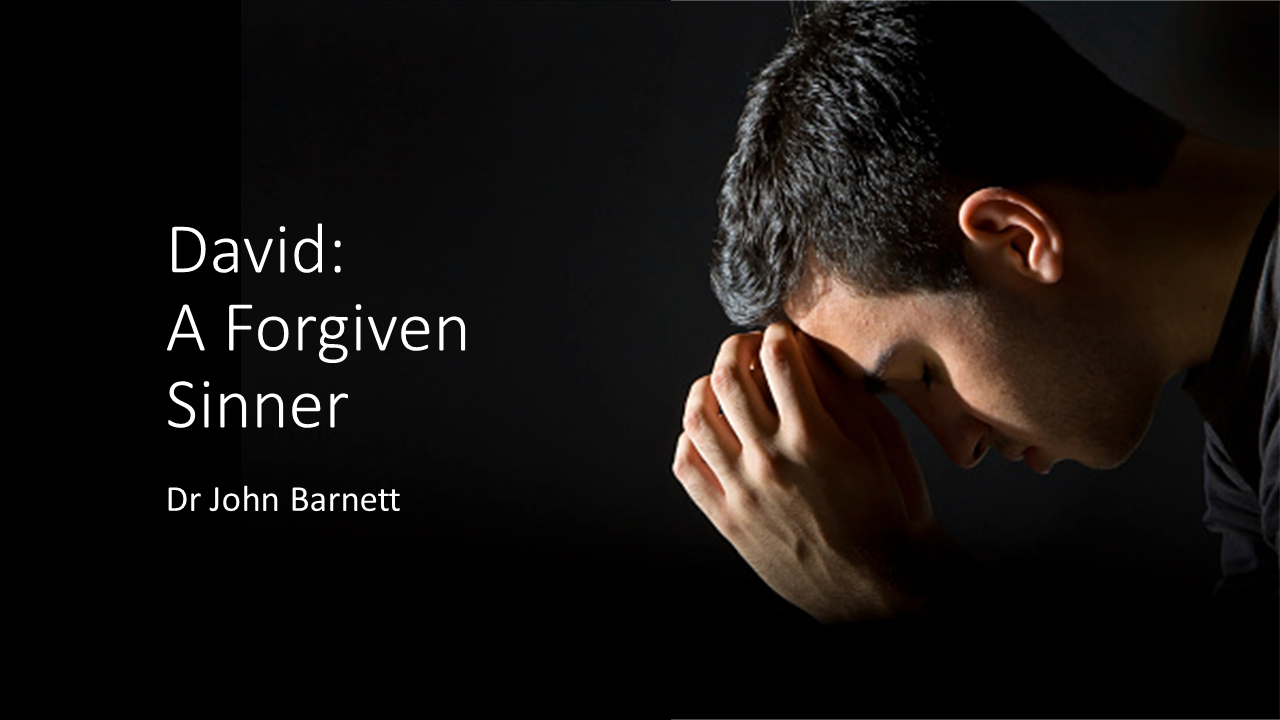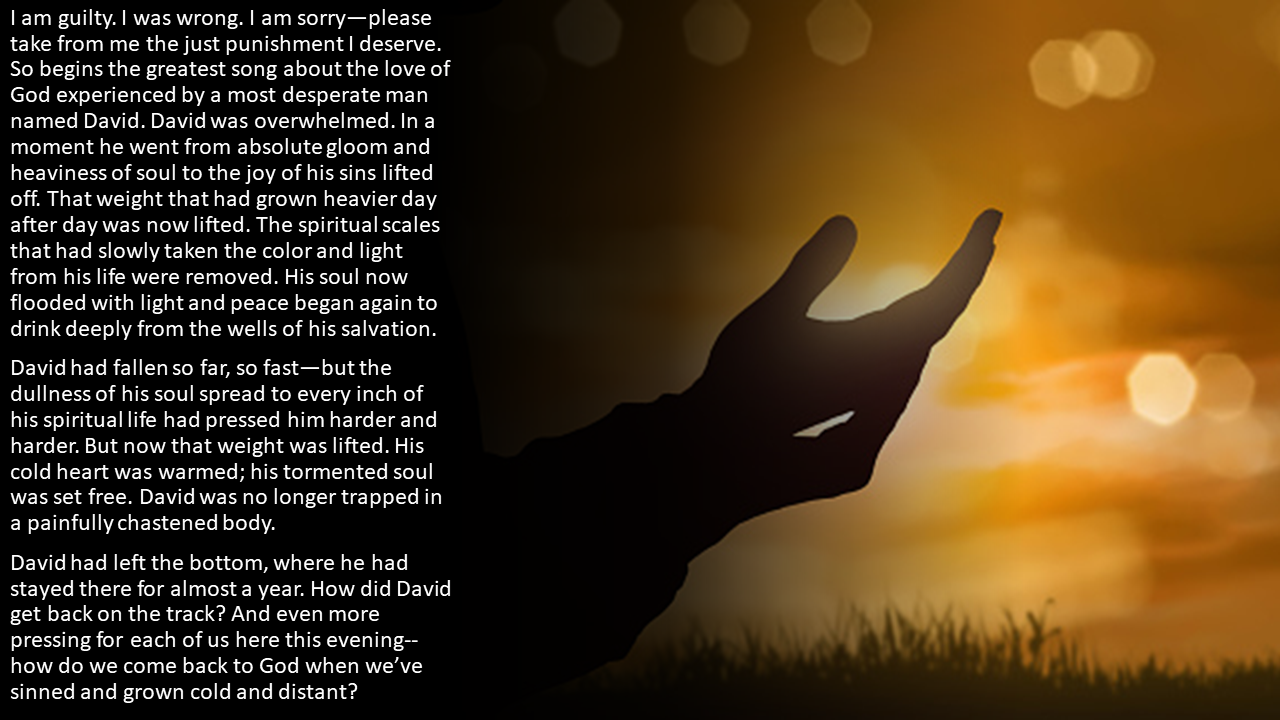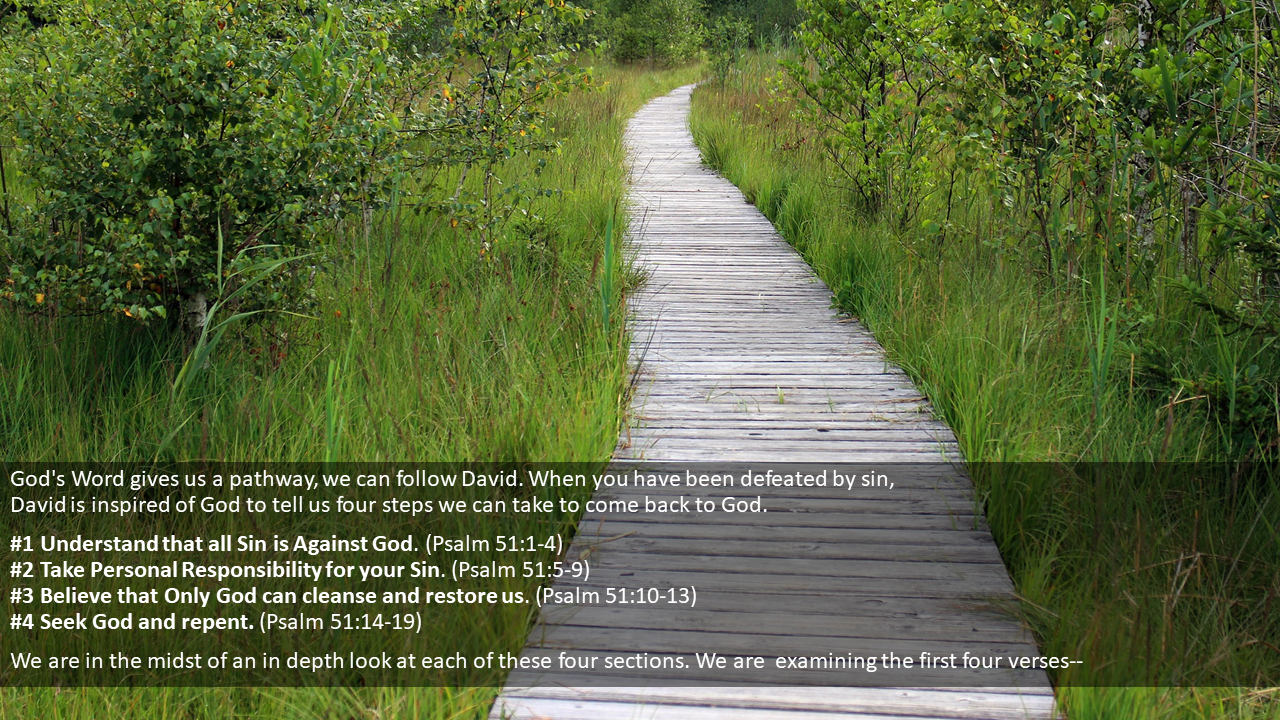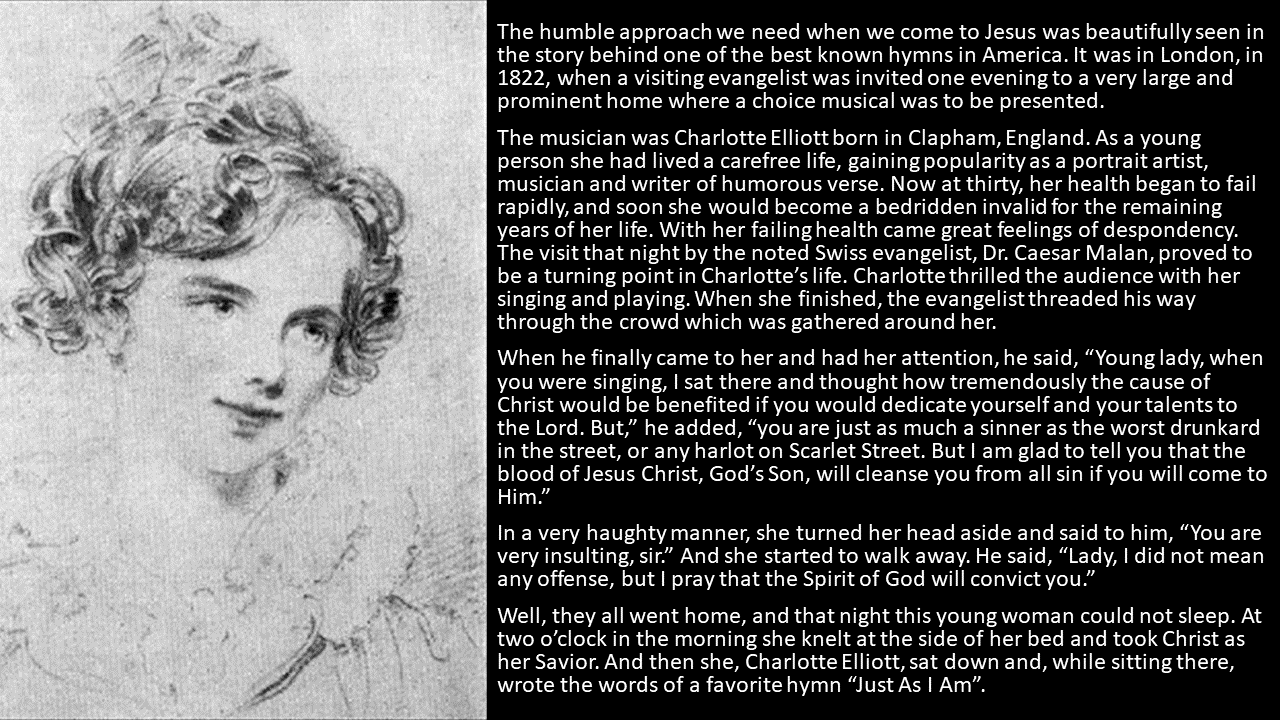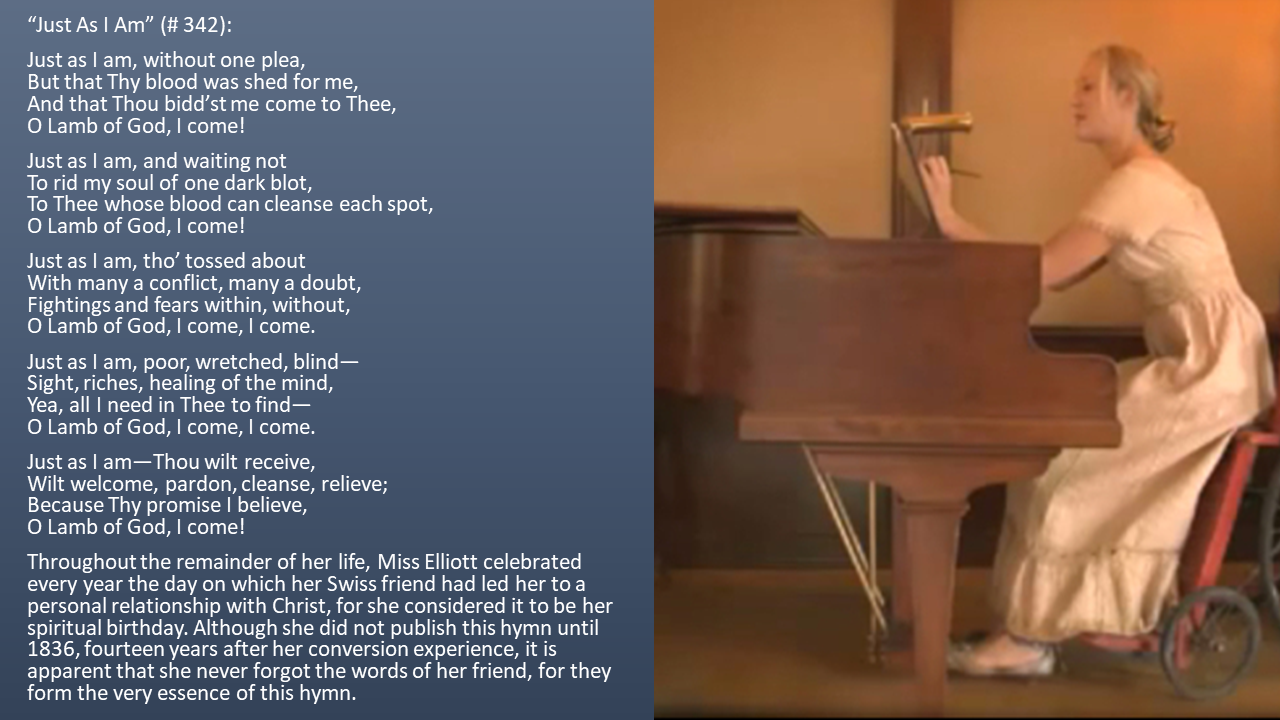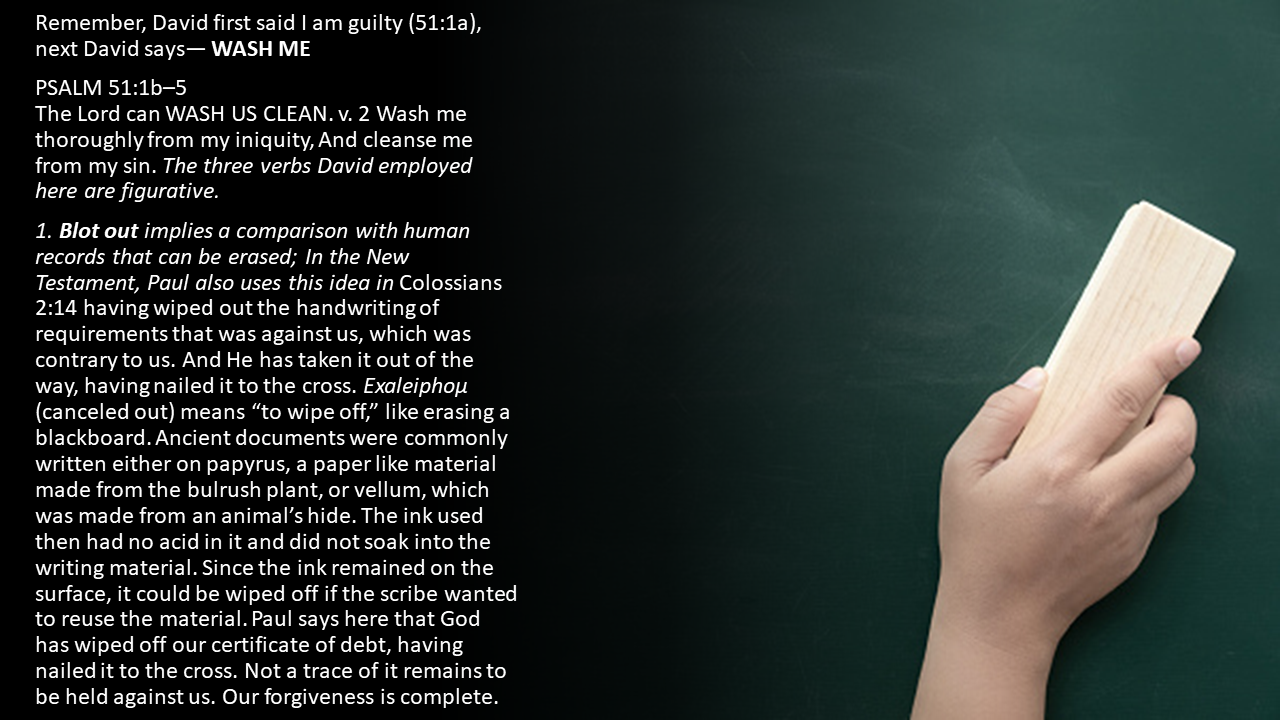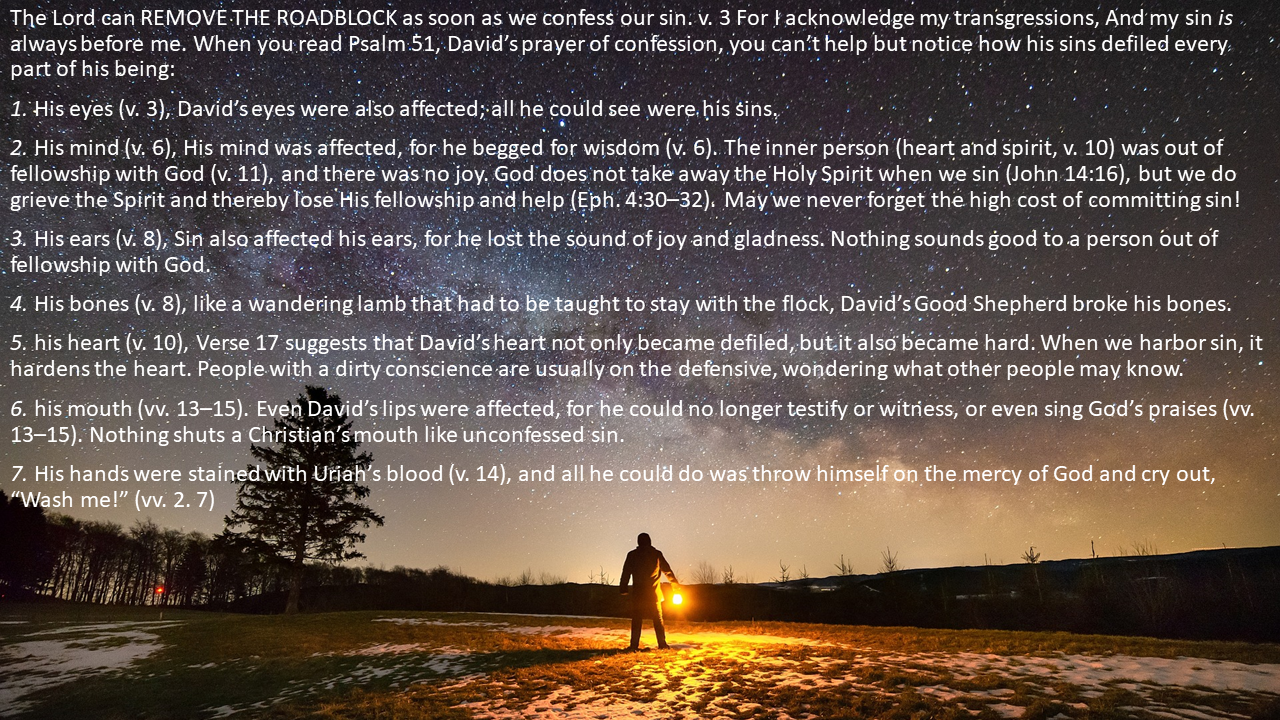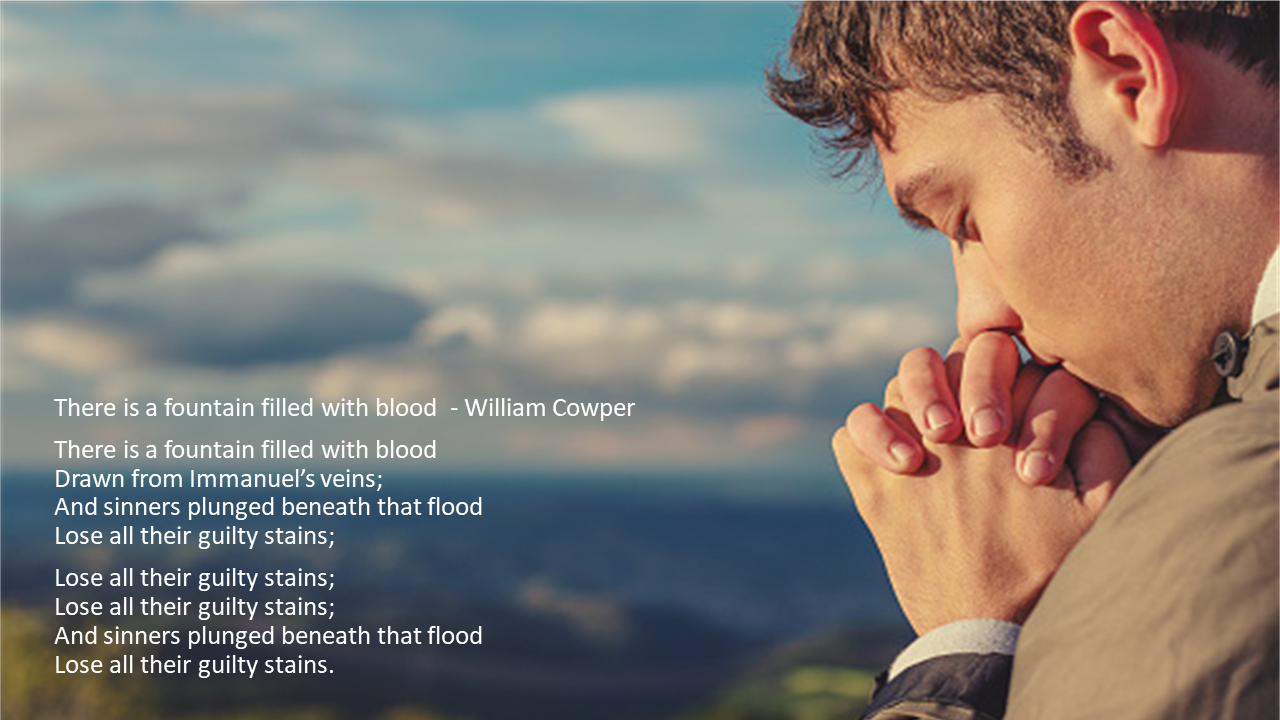If the YouTube video above is not available, here are two other ways to view:
David – A Forgiven Sinner
060723PM
DSS-27
PSALM 51
I am guilty. I was wrong. I am sorry—please take from me the just punishment I deserve.
So begins the greatest song about the love of God experienced by a most desperate man named David.
David was overwhelmed. In a moment he went from absolute gloom and heaviness of soul to the joy of his sins lifted off. That weight that had grown heavier day after day was now lifted. The spiritual scales that had slowly taken the color and light from his life were removed.
His soul now flooded with light and peace began again to drink deeply from the wells of his salvation.
David had fallen so far, so fast—but the dullness of his soul spread to every inch of his spiritual life had pressed him harder and harder. But now that weight was lifted.
His cold heart was warmed; his tormented soul was set free. David was no longer trapped in a painfully chastened body.
David had left the bottom, where he had stayed there for almost a year.
How did David get back on the track? And even more pressing for each of us here this evening–how do we come back to God when we’ve sinned and grown cold and distant?
God’s Word gives us a pathway, we can follow David. When you have been defeated by sin, David is inspired of God to tell us four steps we can take to come back to God.
#1 Understand that all Sin is Against God. (Psalm 51:1-4)
#2 Take Personal Responsibility for your Sin. (Psalm 51:5-9)
#3 Believe that Only God can cleanse and restore us. (Psalm 51:10-13)
#4 Seek God and repent. (Psalm 51:14-19)
We are in the midst of an in depth look at each of these four sections. We are examining the first four verses– Understand that all Sin is Against God. (Psalm 51:1-4)
David starts this first section by saying—
I AM GUILTY
But David sweeps beyond all these human and moral considerations and looks straight at the Almighty and Holy God he had sinned against.
By confessing that he was guilty, David was coming back to God who alone can RENEW OUR RELATIONSHIP broken by sin. v. 1 Have mercy upon me, O God, According to Your loving kindness; According to the multitude of Your tender mercies, Blot out my transgressions.
We learned last time that if you want swift, immediate and relationship restoring help from God, start with that simple guilty plea. If you want to see a David type of response to God in the NT open with me to Luke 18:9-14.
We learned that God just can’t resist this type of heart cry to Him. The Greek tenses tell us that the publican couldn’t stop saying this; he was an ongoing longing on his heart.
Luke 18:13 “And the tax collector, standing afar off, would not so much as raise his eyes to heaven, but beat his breast, [kept on present active participle] saying, ‘God, be merciful to me a sinner!’
Like the publican who wouldn’t even lift his face towards God but just said God be merciful to me, we can also come back to God.
This cry of acknowledgment of our sin is very humbling. Paul reminds us of a secret in our lives as believers—the very way we started is how we are to continue.
Remember Colossians 2:6? “As you have therefore received Christ Jesus the Lord, so walk in Him”. The word received is the very same word for salvation as we find in John 1:12 “…as receive Him, to them He gave…”. That humble contrition that brought us salvation brings us back time after time when we sin. Remember again with me how each of us came, just as we were and humbly fell at His feet pleading for mercy.
JUST AS I AM
The humble approach we need when we come to Jesus was beautifully seen in the story behind one of the best known hymns in America. It was in London, in 1822, when a visiting evangelist was invited one evening to a very large and prominent home where a choice musical was to be presented.
The musician was Charlotte Elliott born in Clapham, England. As a young person she had lived a carefree life, gaining popularity as a portrait artist, musician and writer of humorous verse.
Now at thirty, her health began to fail rapidly, and soon she would become a bedridden invalid for the remaining years of her life. With her failing health came great feelings of despondency. The visit that night by the noted Swiss evangelist, Dr. Caesar Malan, proved to be a turning point in Charlotte’s life.1 Charlotte thrilled the audience with her singing and playing. When she finished, the evangelist threaded his way through the crowd which was gathered around her.
When he finally came to her and had her attention, he said, “Young lady, when you were singing, I sat there and thought how tremendously the cause of Christ would be benefited if you would dedicate yourself and your talents to the Lord.
But,” he added, “you are just as much a sinner as the worst drunkard in the street, or any harlot on Scarlet Street. But I am glad to tell you that the blood of Jesus Christ, God’s Son, will cleanse you from all sin if you will come to Him.”
In a very haughty manner, she turned her head aside and said to him, “You are very insulting, sir.” And she started to walk away. He said, “Lady, I did not mean any offense, but I pray that the Spirit of God will convict you.”
Well, they all went home, and that night this young woman could not sleep. At two o’clock in the morning she knelt at the side of her bed and took Christ as her Savior. And then she, Charlotte Elliott, sat down and, while sitting there, wrote the words of a favorite hymn “Just As I Am” (# 342):
Just as I am, without one plea, But that Thy blood was shed for me, And that Thou bidd’st me come to Thee, O Lamb of God, I come!
Just as I am, and waiting not To rid my soul of one dark blot, To Thee whose blood can cleanse each spot, O Lamb of God, I come!
Just as I am, tho’ tossed about With many a conflict, many a doubt, Fightings and fears within, without, O Lamb of God, I come, I come.
Just as I am, poor, wretched, blind— Sight, riches, healing of the mind, Yea, all I need in Thee to find—
O Lamb of God, I come, I come.
And then the final stanza: Just as I am—Thou wilt receive, Wilt welcome, pardon, cleanse, relieve; Because Thy promise I believe, O Lamb of God, I come!
And that this is the basis on which all of us must come to Christ.2 Throughout the remainder of her life, Miss Elliott celebrated every year the day on which her Swiss friend had led her to a personal relationship with Christ, for she considered it to be her spiritual birthday. Although she did not publish this hymn until 1836, fourteen years after her conversion experience, it is apparent that she never forgot the words of her friend, for they form the very essence of this hymn. 3
Remember, David first said I am guilty (51:1a), next David says—
WASH ME
PSALM 51:1b–5
The Lord can WASH US CLEAN. v. 2 Wash me thoroughly from my iniquity, And cleanse me from my sin. The three verbs David employed here are figurative.
1. Blot out implies a comparison with human records that can be erased; In the NT Paul also uses this idea in Colossians 2:14 having wiped out the handwriting of requirements that was against us, which was contrary to us. And He has taken it out of the way, having nailed it to the cross.
Exaleiphoμ (canceled out) means “to wipe off,” like erasing a blackboard. Ancient documents were commonly written either on papyrus, a paper like material made from the bulrush plant, or vellum, which was made from an animal’s hide. The ink used then had no acid in it and did not soak into the writing material. Since the ink remained on the surface, it could be wiped off if the scribe wanted to reuse the material. Paul says here that God has wiped off our certificate of debt, having nailed it to the cross. Not a trace of it remains to be held against us. Our forgiveness is complete.
2. wash away ( kaμb _as ) compares forgiveness with washing clothing (often viewed as an extension of a person),
Isaiah 64:6 But we are all like an unclean thing, And all our righteousnesses are like filthy rags; We all fade as a leaf, And our iniquities, like the wind, Have taken us away.
Revelation 1:5 and from Jesus Christ, the faithful witness, the firstborn from the dead, and the ruler over the kings of the earth. To Him who loved us and washed us from our sins in His own blood,
3. and cleanse is drawn from the liturgical ceremonial law in which one might be purified for temple participation. These requests (cf. vv. 7, 9) stressed David’s desire for God’s total forgiveness of his transgressions . . . iniquity, and sin. 4
The Lord can REMOVE THE ROADBLOCK as soon as we confess our sin. v. 3 For I acknowledge my transgressions, And my sin is always before me.
When you read Psalm 51, David’s prayer of confession, you can’t help but notice how his sins defiled every part of his being:
1. His eyes (v. 3), David’s eyes were also affected; all he could see were his sins.
2. His mind (v. 6), His mind was affected, for he begged for wisdom (v. 6). The inner person (heart and spirit, v. 10) was out of fellowship with God (v. 11), and there was no joy. God does not take away the Holy Spirit when we sin (John 14:16), but we do grieve the Spirit and thereby lose His fellowship and help (Eph. 4:30–32). May we never forget the high cost of committing sin!
3. His ears (v. 8), Sin also affected his ears, for he lost the sound of joy and gladness. Nothing sounds good to a person out of fellowship with God.
4. His bones (v. 8), like a wandering lamb that had to be taught to stay with the flock, David’s Good Shepherd broke his bones.
5. his heart (v. 10), Verse 17 suggests that David’s heart not only became defiled, but it also became hard. When we harbor sin, it hardens the heart. People with a dirty conscience are usually on the defensive, wondering what other people may know.
6. his mouth (vv. 13–15). Even David’s lips were affected, for he could no longer testify or witness, or even sing God’s praises (vv. 13–15). Nothing shuts a Christian’s mouth like unconfessed sin.
7. His hands were stained with Uriah’s blood (v. 14), and all he could do was throw himself on the mercy of God and cry out, “Wash me!” (vv. 2. 7)
That is because for us as believers sin always isolates and defiles. The Prophet Isaiah confessed that he was “a man of unclean lips” (Isa. 6:5), and then he spoke for all of us when he wrote, “But we are all as an unclean thing, and all our righteousnesses are as filthy rags” (64:6).
Whatever sin touches, it defiles; only the blood of Jesus Christ can wash away that defilement (1 Cor. 6:9–11; 1 John 1:7; Rev. 1:5). 5
1 Corinthians 6:9-11 Do you not know that the unrighteous will not inherit the kingdom of God? Do not be deceived. Neither fornicators, nor idolaters, nor adulterers, nor homosexuals, nor sodomites,10 nor thieves, nor covetous, nor drunkards, nor revilers, nor extortioners will inherit the kingdom of God.11 And such were some of you. But you were washed, but you were sanctified, but you were justified in the name of the Lord Jesus and by the Spirit of our God.
1 John 1:7 But if we walk in the light as He is in the light, we have fellowship with one another, and the blood of Jesus Christ His Son cleanses us from all sin.
Revelation 1:5 and from Jesus Christ, the faithful witness, the firstborn from the dead, and the ruler over the kings of the earth. To Him who loved us and washed us from our sins in His own blood,
Look at Mark 1:40-42 to see this attitude of David portrayed in person at the feet of Jesus. Just as the public found justification by his humble cry, so this leper found complete cleansing by his humble faith in Christ’s powerful ability to cleanse him.
 The Lord can WASH US CLEAN v. 2 I like what William Cowper (#196) once wrote.
The Lord can WASH US CLEAN v. 2 I like what William Cowper (#196) once wrote.
There is a fountain filled with blood Drawn from Immanuel’s veins; And sinners plunged beneath that flood Lose all their guilty stains; Lose all their guilty stains; Lose all their guilty stains; And sinners plunged beneath that flood Lose all their guilty stains.
1 Adapted from two different stories of this hymn. The first written by Osbeck, Kenneth W., 101 Hymn Stories, (Grand Rapids, MI: Kregel Publications) 1997.
2 Details of Charlotte Elliott’s conversion recorded by McGee, J. Vernon, Thru the Bible with J. Vernon McGee, (Nashville: Thomas Nelson Publishers) 2000, c1981.
3 Osbeck, Kenneth W., 101 Hymn Stories, (Grand Rapids, MI: Kregel Publications) 1997.
4 Walvoord, John F., and Zuck, Roy B., The Bible Knowledge Commentary, (Wheaton, Illinois: Scripture Press Publications, Inc.) 1983, 1985.
Slides
Check Out All The Sermons In The Series
You can find all the sermons and short clips from this series, David’s Spiritual Secret here.
Looking To Study The Bible Like Dr. Barnett?
Dr. Barnett has curated an Amazon page with a large collection of resources he uses in his study of God’s Word. You can check it out here.




